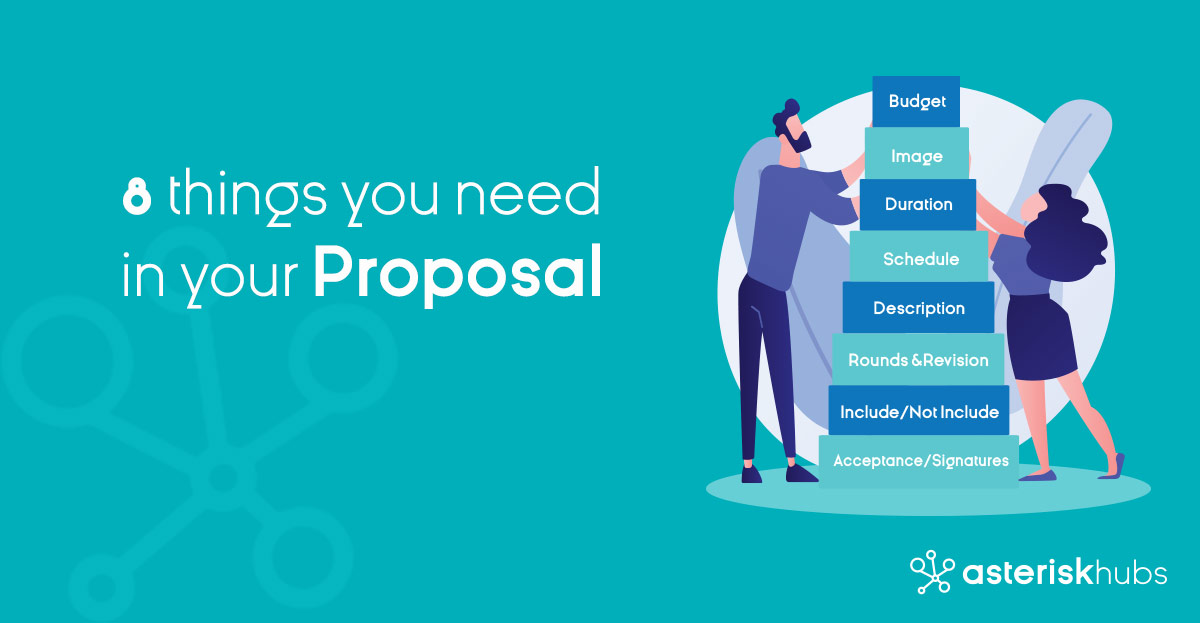8 things you Need in your Proposal

Proposals are required to start till the end of a work. It works for the benefits of both the client and the service providers. A proposal saves time and money if there are any legal issues. These proposals, especially the detailed proposals, can come in handy and save a lot of time, energy and money for any company. Although many companies have learnt this the hard way, there are still many startups that do not know the importance of getting binded by these proposals. Because these proposals later become actual legally binding contracts.
A descriptive and detailed project can get the client and the company on time, budget and scope and get the required results. The proposal helps ease of communication with the clients set their expectations and protect the company with any surprises.
Here are 8 essential things you need in your proposal:
Contents
Descriptions of project phases
Break your project into phases and invoice by phases
Almost all the companies have agreed that working in sprints or in phases saves a lot of time and hassle, instead of trying to finish all of the project at once. Breaking down a project can allow both parties to prioritise what needs to be done now and what would work for the future. Describe each phase of the project so that all the team members and the client have a clear picture of the project. This allows the company to invoice the client by phases.
Images that show your process
Projects go much better when you sell your client on your process
People are visual. Some enjoy visually represented datas instead of a long proposal with many words. In a proposal, the company could use images that visually represent the process of the project. A proposal that has used images, data and the process could actually help win the project. Therefore, moving forward with closing the sale.
Description of rounds and revisions
Describe each round in detail including the feedback rounds
A good proposal describes the rounds and revisions of each phase of the project in detail. This allows the client to give a proper review. Oftentimes, the client just assumes they could make any number of changes at any time during the project. However, a detailed proposal can only allow the client to stick to the allocated number of revisions. Which actually allows the phases to complete in time and the overall project.
What is and what is not included
Protect yourself from assumptions by including an exact list of what is and is not included.
A detailed proposal properly describes what is included in the project and what is not. It a let everyone stay on track. Protecting the company from any assumptions made by the clients or the team members. When the client tells you that they assumed it was included, a properly drafted and detailed proposal could save the follow up assumptions with the client. Therefore, a proper proposal protects from any assumptions by including an exact list of what is included and what is not!
Estimated duration of the project
A planned project and a successful project have proper time, scope and budget set. Many times, due to a miscommunication or due to not having a defined scope a project could be stretched. It is wise to tell your client approximately how long the project is. Mentioning to the client approximately how long the project will take each phase could take in “weeks”. It is ok to give them a range with buffer time.
Estimated project budget
Of three things in any project, duration of the project, allocated budget and the well defined scope. Estimated project budget can allow the team to divide the resources, time, energy and effort that needs to be spent of the specific phases of the project. Assuming the project stays accurate to the scope, how much will you charge the client.?
Invoice schedule
Allocating the time and invoicing the client once the work is completed would allow the client to pay in time and not get surprised with the huge bill. Each phase could have any additional charges that needs on the invoice. The client is not surprised by any additional charges of any sort. Communicating with the client when you will be invoicing for the work completed.
Proposal acceptance/ signatures
Work only once the client signs the proposal. Without an agreement in written acceptance do not start the work. Sometimes, verbal agreement when both parties sound positive, the company hires the resources and the client might change their mind. Therefore, start the work only after both parties have the signed agreement.
Also checkout our socials
Facebook, Instagram, LinkedIn, Twitter and YouTube.
Send us a quick message at https://asteriskhubs.com/contact-us/
About Asterisk Hubs
For the best websites, e-commerce websites, or digital marketing, contact the Asterisk hubs team from any part of the world. With the amazing team members and experienced professionals to understand your business needs and build an e-commerce website.